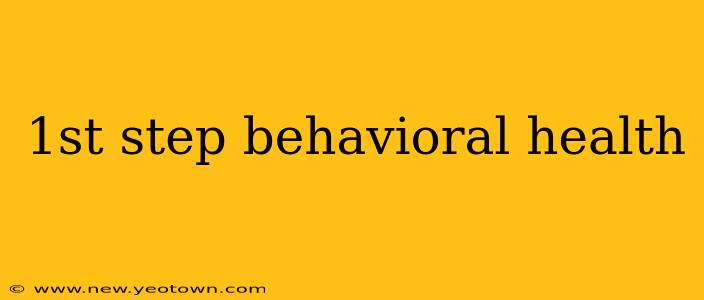Taking the First Step: Navigating Your Journey to Behavioral Health
The first step toward better behavioral health can feel daunting. It's like standing at the edge of a vast, unknown ocean, unsure of where to start your swim. But just like any journey, it begins with a single stroke – a single decision to prioritize your well-being. This isn't about admitting weakness; it's about recognizing your strength and seeking the resources to help you thrive. This guide will help you navigate those initial waters, offering clarity and direction as you embark on your path to improved behavioral health.
What is Behavioral Health?
Before we dive into the steps, let's clarify what behavioral health actually encompasses. It's a broad term encompassing your emotional, psychological, and social well-being. It's about how you cope with stress, build relationships, and make choices that impact your overall happiness and functionality. Issues affecting behavioral health can range from mild anxiety to severe mental illnesses, impacting every aspect of life. Understanding this broad scope is the first crucial step.
What are the First Steps I Can Take?
This is often the most overwhelming question. The good news is, there are many accessible options, and starting small is perfectly okay. The key is finding what works best for you.
1. Self-Assessment & Reflection: Begin by honestly assessing your current state. What are you struggling with? Are you experiencing persistent sadness, anxiety, difficulty sleeping, changes in appetite, or difficulty concentrating? Journaling can be a powerful tool for self-reflection, helping you identify patterns and triggers.
2. Reaching Out to Someone You Trust: Talking to a friend, family member, or trusted mentor can be immensely helpful. Simply sharing your struggles can alleviate feelings of isolation and provide crucial emotional support. Even if they can't offer professional advice, simply having someone to listen can make a world of difference.
3. Seeking Professional Help: This might feel like the biggest hurdle, but remember it's a sign of strength, not weakness. There's no shame in seeking professional help. A therapist or counselor can provide a safe, confidential space to explore your challenges and develop coping mechanisms. Don't be afraid to shop around until you find a therapist with whom you feel comfortable.
How Do I Find a Behavioral Health Professional?
Finding the right professional is crucial. Your primary care physician can be a great starting point; they can provide referrals or suggest resources in your area. Online directories, such as those offered by professional organizations, can also be helpful. Consider what type of professional you need – a therapist, psychiatrist, psychologist, or social worker – each specializing in different areas.
What are the Different Types of Behavioral Health Treatment?
Treatment options are as diverse as the individuals seeking them. Common approaches include:
-
Therapy (Psychotherapy): This involves talking to a therapist to address underlying issues, develop coping strategies, and improve mental well-being. Different types of therapy exist, such as cognitive behavioral therapy (CBT), dialectical behavior therapy (DBT), and psychodynamic therapy.
-
Medication: A psychiatrist can prescribe medication to manage symptoms of certain behavioral health conditions. Medication is often used in conjunction with therapy for optimal results.
-
Lifestyle Changes: Simple changes like improving sleep hygiene, regular exercise, a balanced diet, and mindfulness practices can significantly improve mental well-being.
How Long Does it Take to See Results from Behavioral Health Treatment?
The timeline varies greatly depending on the individual, the severity of the condition, and the type of treatment. Progress isn't always linear; there may be ups and downs along the way. Patience and persistence are key. Open communication with your therapist or doctor is crucial to adjusting your treatment plan as needed.
What if I Can't Afford Treatment?
Cost shouldn't be a barrier to seeking help. Many resources offer affordable or free services. Check with your insurance provider, explore community mental health centers, and research non-profit organizations in your area that provide assistance.
Taking that first step is the most significant action. Remember, you're not alone, and help is available. Start small, be kind to yourself, and celebrate each milestone along your journey toward better behavioral health.

